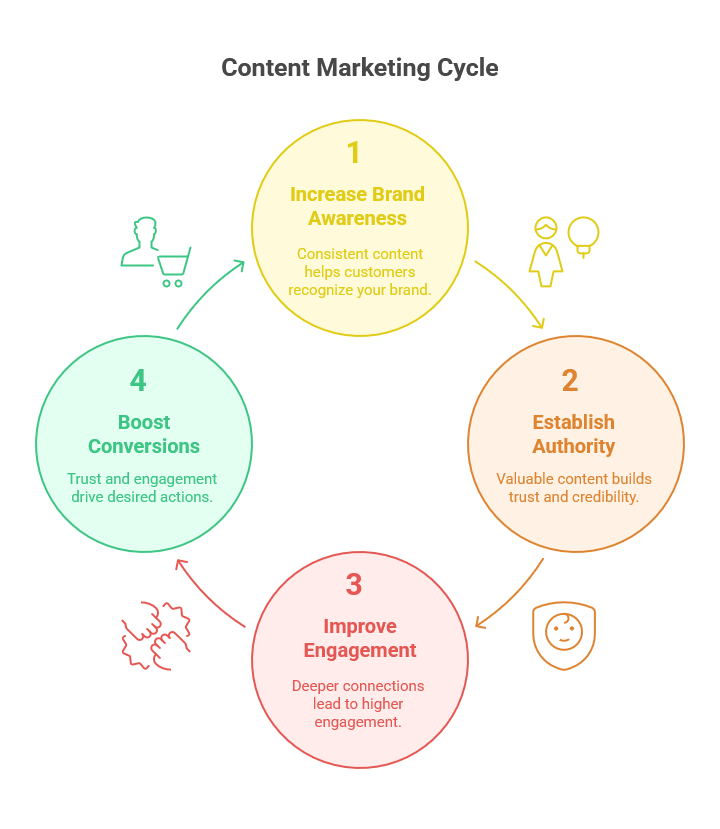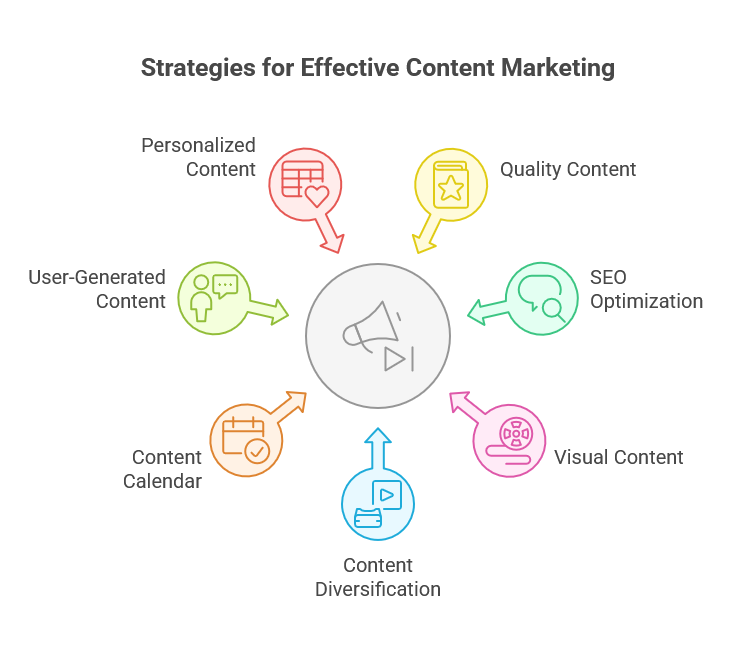Content marketing has become a cornerstone of modern business strategies. With more consumers turning to the internet for information, entertainment, and shopping, brands must adapt to stay relevant. This article will explore how content marketing drives success, detailing its benefits, strategies, and real-world applications for businesses.
What is Content Marketing?
Content marketing is creating and sharing valuable content to attract, engage, and retain a target audience. Instead of pushing products or services directly, content marketing builds trust and authority by offering helpful, informative, or entertaining content. This content could be in blogs, videos, podcasts, social media posts, infographics, etc.
Why is Content Marketing Important?
Content marketing drives success by addressing the needs and interests of your target audience. When done right, it can:
-
Increase Brand Awareness: Customers begin to recognize and remember your brand through consistent, high-quality content. This makes them more likely to choose your products or services in the future.
-
Establish Authority: By offering helpful and valuable content, your brand can become a trusted authority in your industry. This helps build credibility with your audience.
-
Improve Engagement: Engaged customers are more likely to convert into paying customers. Content marketing allows you to connect with your audience on a deeper level.
-
Boost Conversions: When customers trust your brand, they are more likely to purchase, sign up for your newsletter, or take any other desired action.

How Does Content Marketing Work?
Content marketing works by understanding your target audience and providing content that addresses their problems or interests. This involves several steps:
-
Research: Know your audience and what they care about. What problems do they face? What questions do they have? This research will guide your content strategy.
-
Create Valuable Content: Create content that provides value based on your research. Whether answering a common question or providing entertainment, the goal is to give your audience something valuable.
-
Distribute the Content: Share your content on platforms where your target audience spends time. This might include your website, social media, email newsletters, or other online communities.
-
Measure and Adjust: Content marketing is an ongoing process. Monitor the performance of your content and adjust your strategy as needed to achieve better results.
Content Marketing Strategies that Drive Success
The following strategies will help you get the most out of your content marketing efforts:
1. Focus on Quality, Not Quantity
In content marketing, quality trumps quantity. Posting regularly is essential, but creating helpful, engaging, and informative content is more valuable. Content that offers real value is likelier to be shared, linked to, and engaged.
2. Leverage SEO for Better Visibility
Search engine optimization (SEO) is vital to content marketing success. By optimizing your content with relevant keywords, you can increase the likelihood that it appears in search engine results, making it easier for your audience to find. Good SEO practices include using target keywords, optimizing meta descriptions, and building internal and external links.
3. Use Visual Content
Visual content such as images, videos, and infographics can make your content more engaging and shareable. Studies show that people are more likely to engage with visual content, so incorporate it into your content strategy whenever possible.
4. Diversify Your Content Formats
While written blogs are a staple in content marketing, diversifying your content formats can help reach different types of consumers. Some people prefer video content, while others may enjoy podcasts or infographics. By offering various content types, you can engage a broader audience.
5. Create a Content Calendar
Consistency is key to success in content marketing. A content calendar can help you plan and schedule content in advance. It ensures that you’re producing content regularly and allows you to stay organized and on track with your marketing goals.
6. Incorporate User-Generated Content
User-generated content (UGC) can be a powerful tool for content marketing. When your customers create content about your brand, whether it’s a review, testimonial, or social media post, it adds authenticity and trustworthiness to your brand. Sharing this content can also strengthen your relationship with your customers.
7. Personalize Your Content
Personalized content resonates with audiences more effectively than generic content. You can improve engagement and conversions by segmenting your audience and tailoring your content to their needs and preferences. For example, you could create content that addresses a customer’s pain points based on their previous interactions with your brand.

How Content Marketing Drives Business Success
Let’s explore how content marketing directly impacts business growth and success.
1. Improved Customer Loyalty
Content marketing helps build long-term relationships with your audience. When you consistently provide valuable, relevant content, your audience begins to trust your brand. This trust leads to loyalty, meaning they are likelier to continue purchasing from you and recommend your brand to others.
2. Better ROI than Traditional Marketing
Content marketing offers a better return on investment (ROI) than traditional marketing methods. According to HubSpot, content marketing costs 62% less than traditional marketing and generates three times as many leads. This makes it an attractive option for businesses with limited marketing budgets.
3. Supports Lead Generation
Content marketing is an effective tool for lead generation. You can attract potential customers, engage with them, and convert them into leads through valuable content. Offering downloadable resources, such as eBooks or whitepapers, in exchange for email addresses is one way to generate leads through content marketing.
4. Builds Stronger Brand Relationships
Content marketing helps businesses connect with their audience on a deeper level. Content marketing fosters stronger brand relationships through storytelling, customer case studies, and valuable tips. When your audience feels a personal connection to your brand, they are likelier to remain loyal and make repeat purchases.
How to Measure Content Marketing Success
Measuring the success of your content marketing efforts is essential to ensure that your strategy is working. The following metrics can help you gauge the performance of your content:
-
Website Traffic: Increased website traffic indicates that your content attracts more visitors.
-
Lead Generation: Track how many leads your content generates through forms, sign-ups, or downloads.
-
Engagement: Measure engagement metrics such as likes, shares, comments, and time spent on the page.
-
Conversion Rates: Track how many leads convert into customers due to your content.
-
SEO Rankings: Monitor how your content ranks in search engine results for targeted keywords.
Real-Life Examples of Content Marketing Success
Many companies have seen remarkable success with content marketing strategies. Here are a few examples:
-
HubSpot: HubSpot is a leading example of content marketing success. The company has created a vast library of resources, including blogs, eBooks, webinars, and templates. Their inbound marketing strategy has helped them attract millions of visitors and generate countless leads.
-
Coca-Cola: Coca-Cola’s “Share a Coke” campaign is a perfect example of how content marketing can create a massive connection with consumers. The campaign encouraged people to share photos of Coke bottles with their names on them, leading to enormous engagement on social media.
Frequently Asked Questions (FAQ)
-
What is content marketing?
Content marketing is a strategy that involves creating and sharing valuable content to attract and engage a target audience. -
Why is content marketing important?
Content marketing helps increase brand awareness, build authority, and improve customer engagement, which leads to business success. -
How does content marketing improve ROI?
Content marketing costs less than traditional marketing methods and generates more leads, leading to a better return on investment. -
What types of content can I use for content marketing?
Content marketing can include blog posts, videos, social media updates, infographics, podcasts, and more. -
How can I measure the success of content marketing?
You can measure the success of content marketing through website traffic, lead generation, engagement metrics, conversion rates, and SEO rankings.
As technology continues to evolve, content marketing will also grow. Brands must embrace new content formats, such as interactive, virtual, and augmented reality, to stay ahead of the competition. The key will be staying adaptable and continuously creating content that resonates with the audience.

